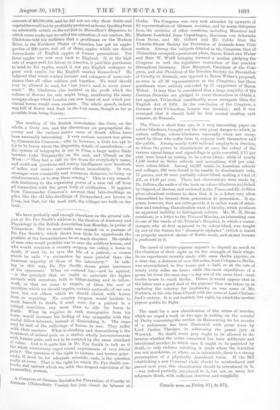We have probably said enough elsewhere on the general sub-
ject of Dr. Pye Smith's address to the Section of Anatomy and Physiology in the British Association last Monday, in praise of Vivisection. But we must make one remark on a passage of Dr. Pye Smith's, which shows how little ho apprehends the position of the humanitarians he so much despises. He speaks of men who would prohibit war to save the artillery horses, and who would condemn a country surgeon for riding a horse to death, if need be, to save the life of a patient,—a course which he calls " a vivisection far more painful than the immense majority of those of the laboratory." In talk- ing in this way, Dr. Pye Smith shows great ignorance of his opponents. What we contend for,—and' he against, —is the principle that we ought to associate the higher animals with ourselves, both in fellow-feeling and in fellow- work, so that we conic to require of them the sort of sacrifices which we should require, ?mantis mutandis, of our own race, but not others which we should shrink with horror from so requiring. No country surgeon would hesitate to work himself to death, if need were, for a patient in a critical condition, any more than. to ride his horse to death. What he requires in such emergencies from his horse would increase his feeling of true sympathy with this useful fellow-labourer, instead of diminishing it. The same may be said of the sufferings of horses in war. They suffer With their masters. What is shocking and demoralising is the treatment of animal pain as a matter wholly incommensurate with human pain, and not to be counted by the same standard of value. And is it quite fair in Dr. Pye Smith to talk as if the whole controversy raged round experiments of very trivial Pain The question of the right to torture, and torture griev- ously, if need be, for adequate scientific ends, is the question really at issue. That is the right for which Dr. Pye Smith con- tends, and against which we, with the- deepest conviction of its immorality, protest.






























 Previous page
Previous page